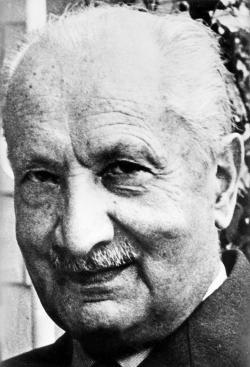The films of Christopher Nolan, including his Batman trilogy, have always been more philosophical than your standard popcorn fare. But an article that appeared in a French newspaper yesterday suggests that The Dark Knight Rises may be the caped crusader’s thinkiest adventure yet.
As New Yorker film writer Richard Brody pointed out on Twitter, French daily newspaper Libération reported that Batman may quote none other than German philosopher Martin Heidegger in the trilogy’s third film. We asked Slate.fr’s Cécile Dehesdin to help with a quick translation:
Christopher Nolan, who became one of the most powerful directors in L.A. after the huge success of Inception, which followed the huge success of The Dark Knight, returns again to the character of Batman… Word is that at some point, he reads aloud bits from Heidegger’s “Was ist Metaphysik.”
Intrigued by this possibility, we asked some leading experts on the philosopher’s work to provide some insight into why Bale’s Batman might be drawn to Heidegger’s writing, and especially that 1929 lecture (commonly translated as “What Is Metaphysics?”).
Xavier philosophy chair Richard Polt, who has written about and translated many of Heidegger’s works, nominated several choice passages, including the obscurely menacing, “Nihilation will not submit to calculation in terms of annihilation and negation. The nothing itself nihilates.” However, Polt suggested that this passage from the lecture might be most appropriate for the film:
Anxiety is there. It is only sleeping. Its breath quivers perpetually through Dasein [human existence], only slightly in what makes us ‘jittery,’ imperceptibly in the ‘Oh, yes’ and the ‘Oh, no’ of men of affairs; but most readily in the reserved and most assuredly in those who are basically daring.

Photo by AFP/Getty Images
How to Read Heidegger and Appropriating Heidegger author Mark Wrathall, on the other hand, agreed with Polt that this darkly inspirational passage seems particularly ripe: “In the clear night of the nothing of anxiety the original openness of beings as such arises: that they are beings.”
My favorite proposal, though, came from Heidegger, Art, and Postmodernity author Iain Thomson, who offered this pithy line: “The nothing itself noths.” Thomson added, “I hear those lines delivered with a growl and an exclamation point, probably after punching someone in the face.”
It’s worth noting that Libération, a popular French daily newspaper founded by Jean-Paul Sartre, provides no source for the rumor. But given how notoriously cumbersome Heidegger’s language can be, perhaps this was the only way Batman could make himself as incomprehensible as Bane.
